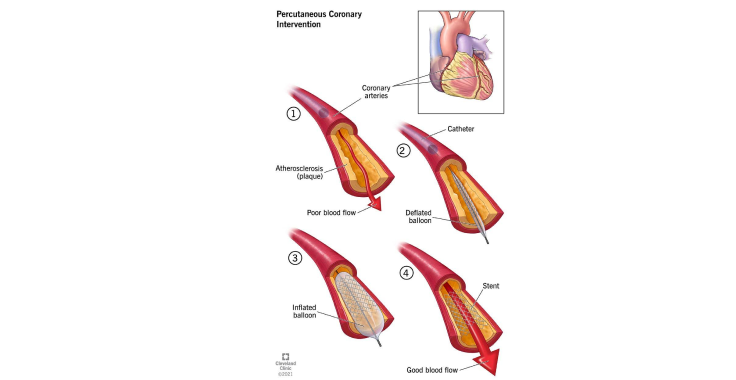Indications of Percutaneous coronary intervention (PCI)?
PCI is primarily indicated in coronary artery diseases and peripheral arterial diseases. Other indications include:
-
Certain types of myocardial infarction (acute ST-elevation MI)
-
Stable angina
-
Arrhythmias
-
Dyspnoea (difficulty breathing) or syncope
-
Severe ischemia
-
Angiographic diagnosis of hemodynamically significant lesions in the blood vessels or blood vessel diameter greater than 1.5mm
Contraindications of Percutaneous coronary intervention (PCI)?
PCI is contraindicated under following conditions:
-
Intolerance of chronic antiplatelet therapy
-
Comorbidities that severely limit lifespan
-
Angiography showing arteries with a diameter lesser than 1.5 mm, diffusely diseased saphenous vein grafts, and other coronary anatomy anomalies (such as stenosis of the ostium or trunk, distal bifurcation or trifurcation stenosis) that is unfavourable for PCI
What happens during Percutaneous coronary intervention (PCI) or Percutaneous transluminal coronary angioplasty (PTCA)?
The cardiologist can assess the location of your blocked artery using X-rays during this treatment, which is carried out under local anaesthesia. You will receive a sedative and have an intravenous (IV) line placed in your arm. A guiding catheter, PTCA wire, and a balloon are then run to the location of the obstruction after a small needle incision is made on the hand or groin to implant a sheath. The cardiologist will place the balloon at the location of the arterial narrowing and repeatedly inflate and deflate the balloon to compress the plaque and widen the artery.
Risks and Complications of Percutaneous coronary intervention (PCI)?
Percutaneous coronary intervention (PCI) is a safe procedure through which the blockages in the arteries are unblocked successfully. There are rarely any complications. In certain instances, there may be re-narrowing of the arteries or there may be a chance that a blood clot will form inside a stent or that there will be bleeding. However, the cardiac specialists at Manipal Hospitals are highly experienced and capable of handling the procedure efficiently and also managing the situation in case of rare complications.
What is the success rate of Percutaneous coronary intervention (PCI) or Percutaneous transluminal coronary angioplasty (PTCA)?
PCI has a high success rate and is recognized as the most effective therapeutic method for individuals with coronary artery disease. Studies have shown that PCI has a success rate of 95%, with the other 5% experiencing obstructions again for several causes. The current recurrence rate following a stent is 10%.
Benefits of Percutaneous coronary intervention (PCI) or Percutaneous transluminal coronary angioplasty (PTCA)?
-
Reduced Risk of Heart Attack by restoring blood flow to the heart muscle further preventing permanent damage and preserving cardiac function.
-
PTCA is minimally invasive which does not require a large incision. This leads to shorter recovery times, reduced pain, and a lesser risk of complications.
-
PTCA provides long lasting benefits combined with lifestyle changes and medications to manage risk factors like high blood pressure and high cholesterol leading to a healthier life.
-
PTCA also improves the quality of life enabling patients to resume their daily activities with less discomfort and lesser heart-related complications.
Why Choose Manipal Hospital Bangalore for Percutaneous coronary intervention (PCI) or Percutaneous transluminal coronary angioplasty (PTCA)?
Manipal Hospitals Bangalore is among the best hospitals for cardiac care in Bangalore, with the most advanced comprehensive cardiothoracic surgery departments. The hospital boasts a team of top cardiologists in Bangalore with national and international recognition. The state-of-the-heart hospital and its expert team make-up for a one-stop solution for the accurate diagnosis of heart conditions and cardiac surgical procedures.
By performing 7,000+ successful and highly precise angioplasty procedures including PTCA/PCI, the cardiac experts at Manipal Hospitals Bangalore have demonstrated extreme commitment to precise and caring treatment of interventional cardiology and vascular diseases. By choosing Manipal hospital for your angioplasty you are assured of:
-
State of the art facilities - Manipal Hospitals houses state of the heart facilities and advanced Cath Labs that enable the experts to carry out precise and accurate diagnosis and procedural execution.
-
Expert Cardiologists & Vascular Specialists – The team of interventional cardiologists and vascular surgeons is highly experienced and skilled and can manage even the most complicated angioplasty cases with utmost efficiency.
-
Personalised Treatment Approach – Treatment plan is carefully curated based on personalized assessments and specific medical needs.
-
Advanced and Minimally Invasive Treatment Options to Promote Faster Recovery - The treatment approach uses minimal invasion of tissues while enabling patients to return to regular activities without delay.
-
24/7 Emergency Cardiac Care - The Emergency Cardiac Care at Manipal Hospitals Bangalore provides a 24/7 service for any sudden cardiac events to enable prompt medical treatments as needed.
Selecting the best hospital is crucial for the health of your heart and vascular system. Avail the best care for Percutaneous coronary intervention (PCI) or Percutaneous transluminal coronary angioplasty (PTCA) in Bangalore at Manipal Hospitals, where experienced cardiologists, advanced technology, and expert care come together.
Meet Our Specialists








